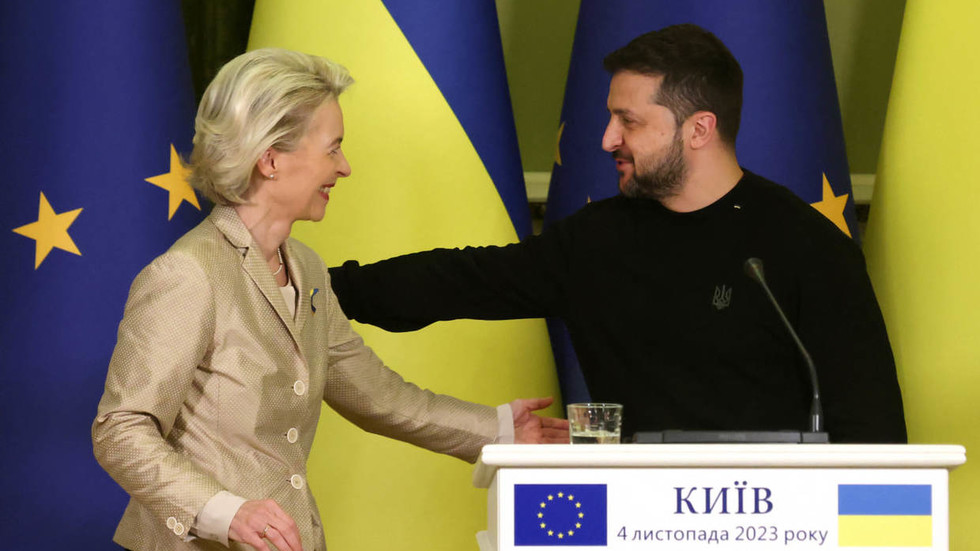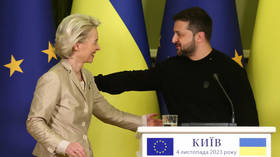
The bloc also faces tough questions about funding Kiev indefinitely

File photo: European Commission President Ursula von der Leyen and Ukrainian President Vladimir Zelensky meet in Kiev on November 4, 2023. © Anatolii STEPANOV / AFP
Brussels might not initiate formal membership talks with Kiev at next month’s summit and could reschedule the matter for March 2024 instead, Reuters reported on Friday, citing an unnamed senior EU official.
Hungary could potentially block the consensus required for such a move, but the problem goes beyond Budapest, said the official, identified only as someone involved in preparing the December 14-15 summit of the heads of 27 EU member states.
Some EU leaders have proposed to take up the topic at the March summit, after the European Commission has had a chance to assess whether Kiev has met all of the EU conditions.
Hungarian PM Viktor Orban warned earlier this month that Ukraine was “absolutely not ready” for EU membership talks, while Foreign Minister Peter Szijjarto called it “absurd” for the bloc to even try evaluating Kiev’s compliance while a war was ongoing.
While the EU has repeatedly vowed to stand with Ukraine for “as long as it takes,” the unnamed official told Reuters that the latest discussions have been a “reality check” on this policy, with national leaders “realizing it’s quite expensive.”
“We cannot allow Ukraine to go bankrupt, it’s not an option for us. But it’s not easy,” the official said. “How do we pay for this?”

Read more
Foreign policy commissioner Josep Borrell’s proposal to commit an additional 50 billion euros ($54 billion) to Ukraine through 2027 has reportedly been criticized “from several sides,” and not just by Hungary.
Germany is the EU’s biggest financial contributor, but, earlier this week, its constitutional court blocked Chancellor Olaf Scholz’s plan to repurpose 60 billion euros ($65.21 billion) in unused pandemic funds for its “climate and transformation fund.” This has further tied Berlin’s hands when it comes to finding money for Kiev, the official told Reuters.
“Maybe we have had too high expectations,” the person told the agency. “Will we continue to support Ukraine financially, military? Do we have the means to do this? Are we sure that the US will be following us over the coming years?”
Washington has already proposed reducing the amount of economic aid – money used to pay government salaries – to Kiev by $275 million a month, with the expectation that the EU, Canada, and Japan would pick up the slack. Congress has yet to address the White House’s $61.4 billion request, however.
Meanwhile, Ukraine’s former prime minister, Nikolay Azarov, has estimated that 75% of Kiev’s budget comes from Western grants or loans at this point, and that President Vladimir Zelensky’s government would have been unable to pay October salaries without a €1.5 billion remittance from the EU.
“It’s not that people have been calling for peace,” the unnamed official told Reuters. “Individual members have said very clearly that we at some point need an end to this. The consensus is to continue to provide support to Ukraine, but some of those questions are coming.”




